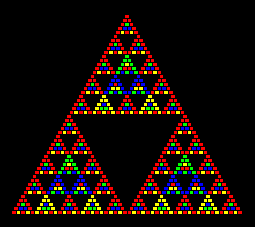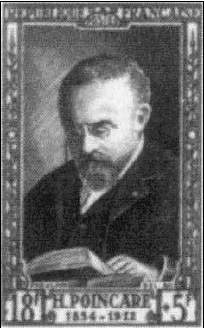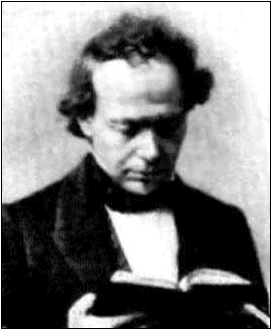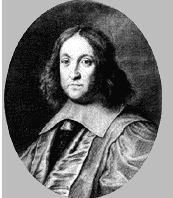






























|

Jules Henri Poincare Henri Poincaré was one of the last universal
mathematicians. He made contributions to the theory of complex functions, to number
theory, algebraic and differential geometry, and to many branches of applied mathematics,
including celestial mechanics.
He invented the notion of an abstract dynamical system in order to attack the question of
the stability of the solar system, and, in the course of this study, invented the field of
topology.
He believed that all physical laws should be "invariant under the Lorentz
group." This insight, which expresses the hidden symmetries of Maxwell's equations,
leads logically to Einstein's theory of special relativity when applied to Newtonian
mechanics.
Henri Poincaré can be said to have been the originator of algebraic topology and of the
theory of analytic functions of several complex variables.
Poincaré entered the Ecole Polytechnique in 1873 and continued his studies, as a student
of Charles Hermite,at the Ecole des Mines, from which he received his doctorate in
mathematics in 1879.
He was appointed to a chair of mathematical physics at the Sorbonne in 1881, a position he
held until his death. Before the age of 30 he developed the concept of automorphic
functions which he used to solve second order linear differential equations with algebraic
coefficients.
His Analysis situs, published in 1895, is an early systematic treatment of
topology. Poincaré can be said to have been the originator of algebraic topology and of
the theory of analytic functions of several complex variables.
He also worked in algebraic geometry and made a major contribution to number theory with
work on Diophantine equations. In applied mathematics he studied optics, electricity,
telegraphy, capillarity, elasticity, thermodynamics, potential theory, quantum theory,
theory of relativity and cosmology. He is often described as the last universalist in
mathematics.
In the field of celestial mechanics he studied the three-body-problem, and theories of
light and electromagnetic waves. He is acknowledged as a co-discoverer, with Albert
Einstein and Hendrik Lorentz, of the special theory of relativity.
His major works include Les Méthods nouvelle de la méchanique celeste in three
volumes published between 1892 and 1899 and Lecons de mecanique celeste (1905). In
the first of these he aimed to completely characterise all motions of mechanical systems.
He invoked an analogy with fluid flow. He also showed that previous series expansions used
in studying the 3-body problem were convergent, but not in general uniformly convergent,
so putting in doubt the stability proofs of Lagrange and Laplace.
He also wrote many popular scientific articles including Science and Hypothesis
(1901), Science and Method (1908), and The Value of Science (1904). A quote
from Poincaré is particularly relevant to this collection on the history of mathematics.
In 1908 he wrote
The true method of foreseeing the future of mathematics is to study its history and
its actual state.
The Poincaré conjecture is one of the most baffling and challenging unsolved problems
in algebraic topology. Homotopy theory reduces topological questions to algebra by
associating with topological spaces various groups which are algebraic invariants.
Poincaré introduced the fundamental group to distinguish different categories of
two-dimensional surfaces. He was able to show that any 2-dimensional surface having the
same fundamental group as the two-dimensional surface of a sphere is topologically
equivalent to a sphere. He conjectured that the result held for 3-dimensional manifolds
and this was later extended to higher dimensions.
Surprisingly proofs are known for the equivalent of Poincaré's conjecture for all
dimensions strictly greater than 3. No complete classification scheme for 3-manifolds is
known, so, there is no list of possible manifolds that can be checked to verify that they
all have different homotopy groups.
Poincaré was first to consider the possibility of chaos in a deterministic system, in his
work on planetary orbits.
"A very small cause which escapes our notice determines a considerable effect that we
cannot fail to see, and then we say that the effect is due to chance. If we knew exactly
the laws of nature and the situation of the universe at the initial moment, we could
predict exactly the situation of the same universe at a succeeding moment. But even if it
were the case that the natural laws had nolonger any secret for us, we could still know
the situation approximately. If that enabled us to predict the succeeding situation with
the same approximation, that is all we require, and we should say that the phenomenon had
been predicted, that it is governed by the laws. But is not always so; it may happen that
small differences in the initial conditions produce very great ones in the finalphenomena.
A small error in the former will produce an enormous error in the latter. Prediction
becomes impossible...". (Poincaré)
Little interest was shown in his work until the modern study of chaotic dynamics began
in 1963.Thus Poincaré can truly be said to be is the Father of Chaos.
-o-

|
Poincaré
quotes: "Mathematicians are born, not made."
"I entered an omnibus to go to some place or other. At that moment when I put my foot
on the step the idea came to me, without anything in my former thoughts seeming to have
paved the way for it, that the transformations I had used to define the Fuchsian functions
were identical with non-Euclidean geometry."
"In the old days when people invented a new function they had something useful in
mind. Now, they invent them deliberately just to invalidate our ancestors' reasoning, and
that is all they are ever going to get out of them."
"How is an error possible in mathematics? A sane mind should not be guilty of a
logical fallacy, yet there are very fine minds incapable of following mathematical
demonstrations. Need we add that mathematicians themselves are not infallible?"
"Point set topology is a disease from which the human race will soon recover."
"Mathematics is the art of giving the same name to different things.
[As opposed to the quotation: Poetry is the art of giving different names to the same
thing]."
"Later generations will regard Mengenlehre (set theory) as a disease from which one
has recovered.
[Whether or not he actually said this is a matter of debate amongst historians of
mathematics.]"
"What is it indeed that gives us the feeling of elegance in a solution, in a
demonstration? It is the harmony of the diverse parts, their symmetry, their happy
balance; in a word it is all that introduces order, all that gives unity, that permits us
to see clearly and to comprehend at once both the ensemble and the details."
"Thus, be it understood, to demonstrate a theorem, it is neither necessary nor even
advantageous to know what it means. The geometer might be replaced by the "logic
piano" imagined by Stanley Jevons; or, if you choose, a machine might be imagined
where the assumptions were put in at one end, while the theorems came out at the other,
like the legendary Chicago machine where the pigs go in alive and come out transformed
into hams and sausages. No more than these machines need the mathematician know what he
does."
"Talk with M. Hermite. He never evokes a concrete image, yet you soon perceive that
the more abstract entities are to him like living creatures."
"Science is built up with facts, as a house is with stones. But a collection of facts
is no more a science than a heap of stones is a house."
"A scientist worthy of his name, about all a mathematician, experiences in his work
the same impression as an artist; his pleasure is as great and of the same nature."
"The mathematical facts worthy of being studied are those which, by their analogy
with other facts, are capable of leading us to the knowledge of a physical law. They
reveal the kinship between other facts, long known, but wrongly believed to be strangers
to one another."
"Mathematicians do not study objects, but relations between objects. Thus, they are
free to replace some objects by others so long as the relations remain unchanged. Content
to them is irrelevant: they are interested in form only."
"Thought is only a flash between two long nights, but this flash is everything."
"The mind uses its faculty for creativity only when experience forces it to do
so."
"Mathematical discoveries, small or great are never born of spontaneous generation
They always presuppose a soil seeded with preliminary knowledge and well prepared by
labour, both conscious and subconscious."
"Absolute space, that is to say, the mark to which it would be necessary to refer the
earth to know whether it really moves, has no objective existence.... The two
propositions: "The earth turns round" and "it is more convenient to suppose
the earth turns round" have the same meaning; there is nothing more in the one than
in the other."
" ...by natural selection our mind has adapted itself to the conditions of the
external world. It has adopted the geometry most advantageous to the species or, in other
words, the most convenient. Geometry is not true, it is advantageous."
"One would have to have completely forgotten the history of science so as to
not remember that the desire to know nature has had the most constant and the
happiest influence on the development of mathematics."
"Les faits ne parlent pas."
"Facts do not speak."
"If one looks at the different problems of the integral calculus which arise
naturally when one wishes to go deep into the different parts of
physics, it is impossible not to be struck by the analogies existing. Whether it be
electrostatics or electrodynamics, the propogation of heat, optics,
elasticity, or hydrodynamics, we are led always to differential equations of
the same family."
"Science is built up of facts, as a house is built of stones; but an accumulationof
facts is no more a science than a heap of stones is a house."
"To doubt everything, or, to believe everything, are two equally convenient
solutions; both dispense with the necessity of reflection."
"Ideas rose in clouds; I felt them collide until pairs interlocked, so to speak,
making a stable combination."
"Invention consists in avoiding the constructing of useless contraptions and in
constructing the useful combinations which are in infinite minority. To invent is to
discern, to choose."
"Thus, be it understood, to demonstrate a theorem, it is neither necessary nor even
advantageous to know what it means ..."
-o-
Biographies
Kurt Gödel
Douglas Hofstadter author of
Gödel, Escher, Bach: an Eternal Golden Braid; and Guggenheim Fellow, 1980-81.
Omar Khayyam, poet and mathematician
Jules Henri Poincare a mathematician,
physicist, and philosopher of science.
Tutorials
Introduction to Green's Functions
The Equichordal Point Problem
|













